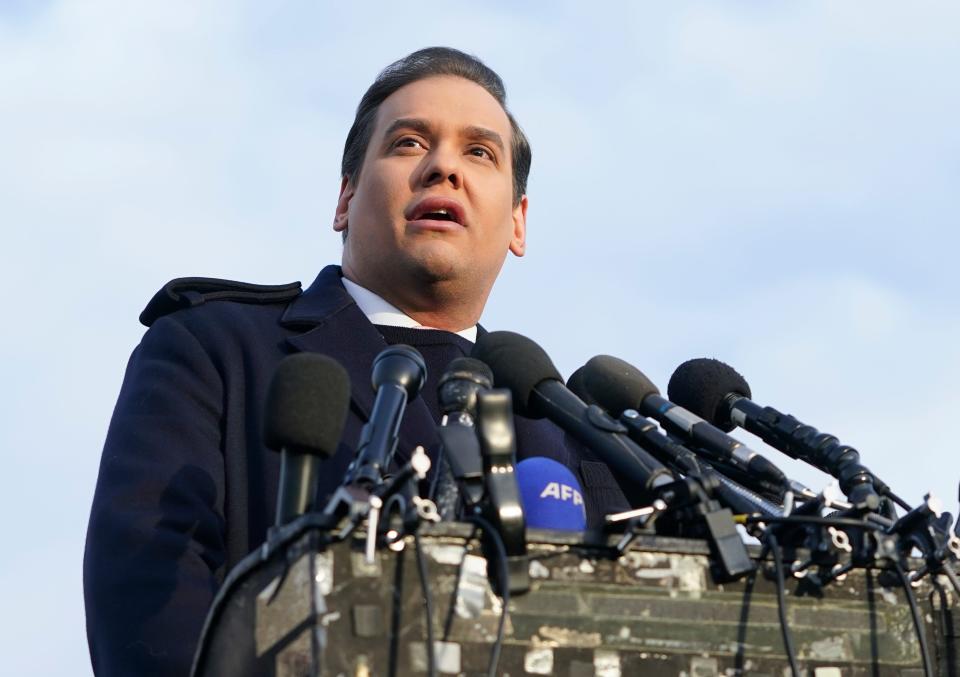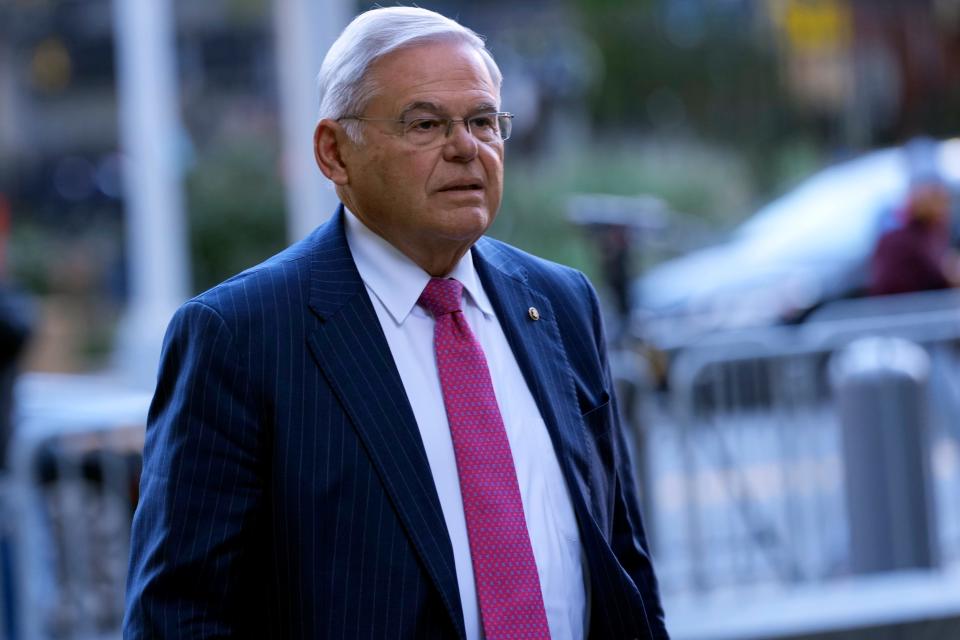The Senate Ethics Committee hasn't moved on Bob Menendez. This may be why | Stile
- Oops!Something went wrong.Please try again later.
The U.S. House of Representatives swiftly dislodged the disgraced George Santos from office with a rare, bipartisan ratification of disgust.
The Dec. 1 vote to expel the New York fabulist and accused thief came about a year after The New York Times first began probing his seedy and imagined background. It was rare for Congress not only to take such a dramatic step, but to do it so swiftly.
The Santos debacle raises an obvious question:

If the House, constantly engulfed in partisan warfare, can pull this off, why hasn’t the Senate taken any similar action toward New Jersey Sen. Bob Menendez, accused of serving as a clandestine agent of the Egyptian government who was compensated with bribes?
The federal criminal charges filed against Menendez and his wife, Nadine Arslanian, are a potentially far more damaging breach of one of the nation’s most cherished Democratic institutions than stealing campaign funds to smooth out Santos' puffy jowls with Botox.
Why won't the Senate move on Bob Menendez?
So where is the Senate's internal ethics watchdog? Why hasn’t it moved to crack down on — or expel — one of its own legally challenged members, who already dodged a separate, tawdry corruption case five years ago?
Secrecy and tradition help explain why.
The U.S. Senate Select Committee on Ethics said in a terse statement in September that it “does not comment on matters pending before the Committee or matters that may come before the Committee" and that “as a matter of longstanding policy” the committee of four Democratic senators and four Republicans holds its powder until the federal case against Menendez is resolved.
In fact, that is precisely the path the panel took in the first Menendez corruption case over the past decade.

The ethics panel launched its own investigation of Menendez in 2012 but put it on hold when, four years later, the Justice Department formally accused the senator of accepting campaign donations, expensive stays at a luxury hotel and free flights in exchange for helping a south Florida eye doctor, Salomon Melgen, settle a dispute with Medicare, obtain visas for Melgen’s foreign girlfriends and protect a port security contract with the Dominican Republic.
The ethics panel did not resume its work until after an 11-week trial ended in November 2017 in a hung jury. Five months later — and after the Justice Department dropped the case — the ethics panel “severely admonished” Menendez, said he “violated Senate Rules, federal law and applicable standards of conduct” and ordered him to pay for the gifts at appropriate market value and amend his financial disclosure forms.
But that was the end of that sordid chapter. Menendez resumed his duties, but, according to federal officials, it was not much longer before was on the path toward the current set of charges, which include accusations of taking bribes in the form of bars of gold bullion, cash and a new car for his wife.
He is also accused of accepting payments in exchange for using his clout to block a state and federal investigation of two New Jersey men. Menendez has denied the charges and says he will be cleared once all the facts of the case are made clear. He has not ruled out running for reelection next year.
'Bobby from Jersey': Sen. John Fetterman trolls Sen. Bob Menendez with George Santos Cameo
'Very reluctant to throw one of their own into the sacrificial fire'
So it might seem that the outraged response to his first major brush with federal law enforcement would prompt the Ethics Committee to act with more expediency the second time around. Shouldn't the Senate be ready to replicate the ethics enforcement path hewn by the House?
Not likely, say analysts and observers of the committee, which is known for its glacial pace and secretive deliberations.
For one thing, the Senate is ruled by a clubby set of customs. While Democratic Sen. John Fetterman, D-Pa., has garnered national attention for publicly calling for Menendez to step down — and trolling him by hiring Santos for a juvenile video prank — the Democratic caucus has largely kept a low profile.
After publicly calling on Menendez to resign when the charges were unsealed in September, most Senate Democrats have kept mum.
“I think it underscores a really, really important difference between the House and Senate," said Ross Baker, a Rutgers University political scientist who has studied the Senate.
He said the “Senate is a very small institution, in which interpersonal relationships are extremely important. Senators are very, very reluctant to throw one of their own into the sacrificial fire of public indignation. There's a kind of a kind of an unspoken code that you just never should rush to judgment on a colleague.”
More Charlie Stile: Can Steve Fulop have it both ways on nepotism? Can he attack Menendez and support Murphy?
Senate Ethics Committee: 'a black box'
That institutional reluctance is reflected in the committee’s skimpy record of enforcement, according to a recent study cited by the Campaign Legal Center, or CLC, a Washington, D.C., nonprofit ethics and campaign finance watchdog, which filed a formal early complaint about Santos’ conduct.
The study, conducted by the outlet Raw Story, found that among the 1,523 complaints sent to the Senate Ethics Committee from 2007 to 2022, none resulted in a formal disciplinary action. (A “severe admonishment” letter like the one Menendez received is not considered formal punishment.)
“It’s a little bit of a black box," said Delaney Marsco, senior legal counsel for ethics at the CLC. “We don't really know what they're doing at any given time. We don't know [if] they’re investigating anybody."
She added that in cases where an investigation becomes known, there’s “no policy of making everything public in the end.”
The committee did not return a call regarding a possible probe of the Menendez allegations. A Menendez official did not respond to requests for comment.
Marsco also drew an important distinction between the Senate and the House, which was confronted with a virtual “tsunami” of accusations about Santos — from his alleged stealing from his campaign account for personal expenses to his false biography.
She noted that in addition to the House Ethics Committee, which is filled with members of Congress, the lower House is monitored by the Office of Congressional Ethics, a separate, independent body made up of public, unelected members who are not tied down by the same political, interpersonal relations as elected House members. The office can — and often does — make its findings public.
It was the OCE’s own report, completed in May, that helped prod the House Ethics Committee to release its devastating report on Santos last month. That release led to the third and final vote to expel Santos. It was the power of transparency that turned the tide.
“The Senate doesn't have an independent investigatory body that makes everything public,’’ Marsco said. “They just have this ethics committee.”
The black box, in other words.
And because of its lack of transparency, some speculate about the Ethics Committee’s political motives. Baker argues that perhaps the swift, across-the-board calls in New Jersey for Menendez to step down may have given the panel reason for pause, believing that the charges filed by the Southern District of New York would doom his chances if he ran for reelection or he might eventually cave.
“The feeling was well, you know, ‘If these domestic sources of support are opposed to him, you know, we'll let the voters take care of it,’ “ Baker said.
Marsco also noted that Supreme Court rulings over the past decade have narrowed the legal definition — and that, in turn, has made committee members additionally cautious about leaping into a probe.
Whatever the case may be, the little black box is not likely to play a role in pushing Menendez to the Senate exit door.
Charlie Stile is a veteran New Jersey political columnist. For unlimited access to his unique insights into New Jersey’s political power structure and his powerful watchdog work, please subscribe or activate your digital account today.
Email: stile@northjersey.com
This article originally appeared on NorthJersey.com: Bob Menendez: Why won't the Senate Ethics Committee move?

